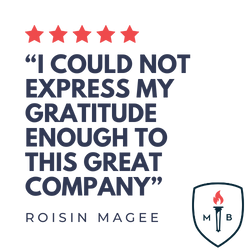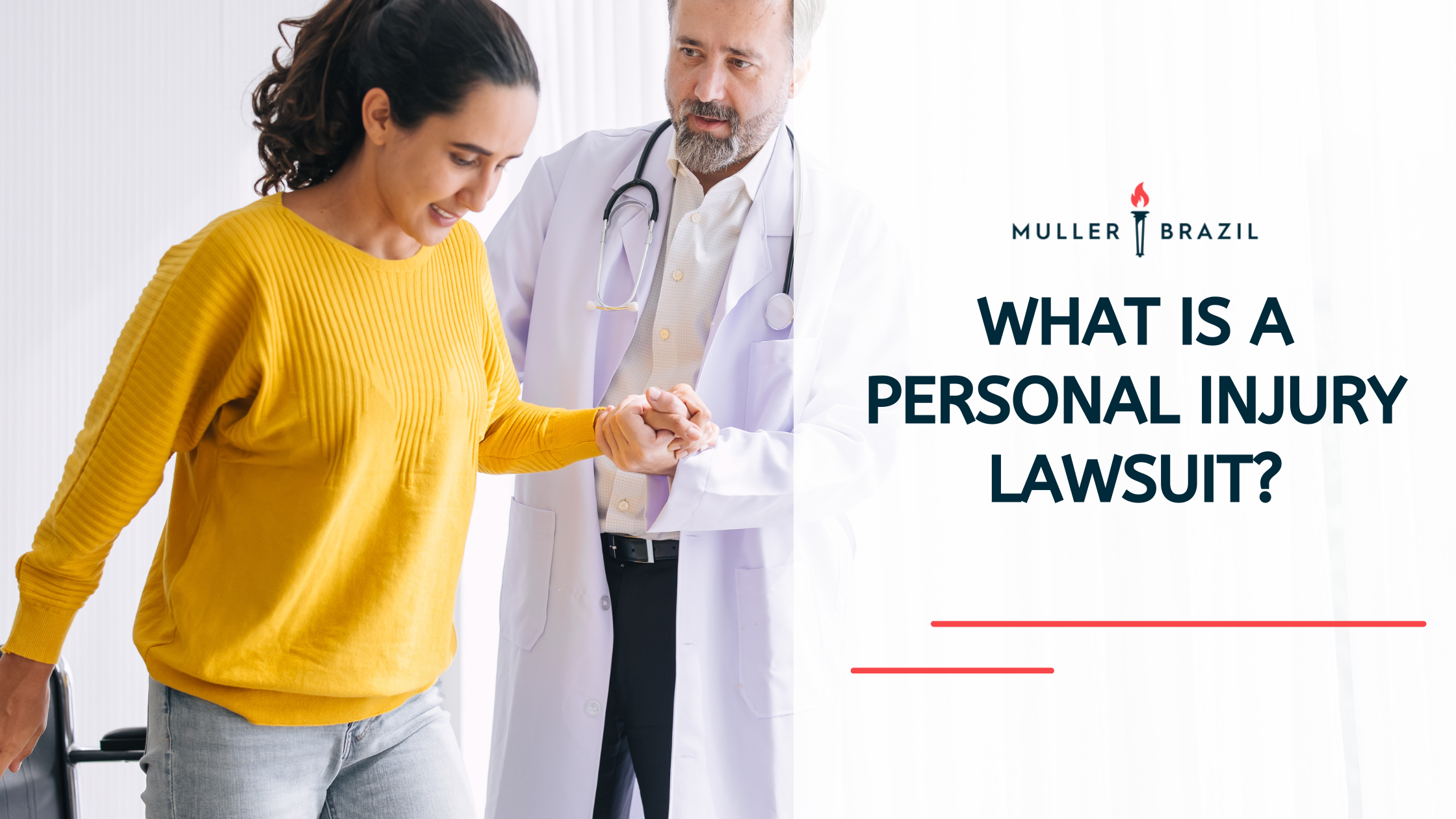A personal injury lawsuit is a legal action taken by an injured person to seek compensation for harm suffered due to another party's negligence or wrongful actions. Whether it's a car accident, a slip and fall, or harm caused by a defective product, personal injury law exists to help individuals recover compensation for medical expenses, lost wages, emotional distress, and more.
At Muller Brazil, we understand the challenges faced by those who have suffered harm. As a trusted personal injury law firm located in Philadelphia, we are dedicated to helping clients through personal injury claims and secure fair compensation for their injuries. With the right guidance, you can focus on your recovery while we handle the legal process.
What Is Personal Injury and What Cases Are Covered?
Personal injury refers to harm caused to an individual’s body, mind, or emotions due to the negligence, recklessness, or intentional actions of another party. These cases are part of civil law, meaning the injured party seeks financial compensation rather than criminal punishment for the responsible party.
Common Types of Personal Injury Cases
Personal injury law covers a wide range of scenarios. Some of the most common include:
- Car Accidents: Whether caused by distracted driving, speeding, or failure to obey traffic signals, these are among the leading causes of bodily injury lawsuits.
- Slip and Fall Accidents: Property owners, including store owners, have a legal duty to maintain safe premises. Hazards like wet floors or uneven sidewalks can lead to serious injuries.
- Medical Malpractice: When a healthcare provider's negligence causes harm, such as misdiagnoses or surgical errors, it may result in a personal injury claim.
- Product Liability: Strict liability applies to manufacturers of defective or dangerous products that cause injuries.
- Workplace Injuries: Injuries occurring on the job may involve workers’ compensation claims or third-party lawsuits.
No matter the type of case, the goal of a personal injury lawsuit is to recover compensation for the harm suffered. Whether it’s medical expenses, lost wages, or emotional distress, understanding your rights is the first step to securing fair compensation.
What Do You Need to Prove in a Personal Injury Lawsuit?
To succeed in a personal injury lawsuit, the injured party must prove specific elements that establish the defendant's responsibility for the harm caused. These elements form the foundation of all personal injury claims:
Legal Duty: The responsible party (defendant) must have owed a duty of care to the injured person (plaintiff). For example:
- A driver has a legal duty to follow traffic laws and drive safely to avoid accidents.
- A store owner has a duty to keep their premises safe for customers.
Breach of Duty: The plaintiff must show that the defendant failed to meet their legal duty, either through negligence or reckless actions. This could include:
- Running a red light, causing a car accident.
- Failing to clean up a spill, leading to a slip and fall incident.
Causation: The breach of duty must be directly linked to the injuries suffered. In other words, the accident caused by the defendant’s actions must have resulted in the plaintiff’s harm. Evidence such as police reports, witness statements, and medical records can establish this connection.
Damages: Finally, the injured person must demonstrate that they suffered measurable losses as a result of the accident. These damages may include:
- Medical expenses for treatment and rehabilitation.
- Lost wages due to missed work.
- Emotional distress and pain from the physical injury.
Steps in a Personal Injury Lawsuit
Understanding the process of filing a personal injury lawsuit can help you feel more prepared and confident as you seek compensation. While every case is unique, most person's injury claims follow these important steps:
1. Initial Consultation
The process begins with a free consultation with a personal injury attorney. During this meeting, you’ll discuss the details of the accident, injuries suffered, and potential legal action. An attorney can evaluate whether you have a valid claim and explain your options.
2. Investigation and Gathering Evidence
Your attorney will conduct a thorough investigation to build a strong case. This includes:
- Collecting police reports and witness statements.
- Obtaining medical records to document injuries and medical treatment.
- Analyzing the accident scene and other relevant details.
3. Filing a Complaint
Once the evidence is gathered, your attorney will file a legal document called a complaint with the court. This outlines the injuries, the legal basis for the claim, and the compensation being sought from the responsible party.
4. The Discovery Phase
During discovery, both sides exchange evidence and information. This can include depositions, written questions, and requests for documents. The goal is to clarify the facts and prepare for negotiations or trial.
5. Negotiation and Settlement
In most cases, personal injury lawsuits are resolved through negotiations rather than going to court. Your attorney will work with the responsible party’s insurance company to secure compensation for medical expenses, lost wages, and other damages.
6. Trial (if Necessary)
If a fair settlement cannot be reached, the case may proceed to trial. Your attorney will present evidence, question witnesses, and advocate for the compensation you deserve. While trials are less common, they ensure that injured parties can seek justice.
Types of Compensation in Personal Injury Cases
A personal injury lawsuit aims to help the injured party recover compensation for the physical, emotional, and financial harm they have endured. This compensation, often referred to as "damages," can be divided into three main categories:
Economic Damages
These are measurable losses with a specific dollar amount. They include:
- Medical Expenses: Costs for emergency care, ongoing medical treatment, rehabilitation, and medication.
- Lost Wages: Income lost due to missed work while recovering from the injury.
- Property Damage: Repairs or replacement of damaged property, such as a vehicle in a car accident.
Non-Economic Damages
These damages are more subjective and address the impact of the injury on your quality of life:
- Pain and Suffering: Compensation for physical pain and emotional distress caused by the injury.
- Mental Anguish: Psychological impacts, such as anxiety or depression resulting from the accident.
- Loss of Enjoyment of Life: If the injury prevents you from participating in activities you once enjoyed.
Punitive Damages
In cases where the defendant’s actions were especially reckless or malicious, the court may award punitive damages. These are intended to punish the responsible party and deter similar behavior in the future. While less common, they play an important role in cases involving egregious negligence.
The Importance of Fair Compensation
Recovering fair compensation assures that injured individuals can cover medical expenses, regain lost income, and begin to move forward after suffering harm. Working with a knowledgeable personal injury attorney increases the likelihood of obtaining the full amount you deserve.
Contact Us Now
Understanding the Statute of Limitations
When pursuing a personal injury lawsuit, time is a significant factor. Each state has specific laws, known as the statute of limitations, that determine how long an injured person has to file a claim. In Pennsylvania, the statute of limitations for most personal injury cases is two years from the date of the accident.
Why Does the Statute of Limitations Matter?
If you miss this deadline, you may lose your right to seek compensation for the harm suffered. Filing within the allowed time ensures:
- Evidence, such as police reports and witness statements, remains intact.
- Your claim remains valid under Pennsylvania law.
Exceptions to the Rule
While the two-year deadline applies to most cases, there are exceptions:
- Injuries to Minors: The statute of limitations may be extended until the injured party turns 18.
- Discovery Rule: In some cases, the clock starts when the injury is discovered, not when the accident occurred. For example, in medical malpractice cases, an injury may not become apparent until much later.
Acting Quickly Can Strengthen Your Case
Beyond legal deadlines, filing promptly can help:
- Preserve important evidence, such as photographs of the accident scene or documentation of medical treatment.
- Ensure witnesses’ recollections remain accurate.
- Expedite negotiations with the insurance company or responsible party.
If you’ve suffered harm due to someone else’s negligence, don’t wait to take action. A personal injury attorney can help you through the legal system and protect your rights within the required timeframe.
Why Hire a Personal Injury Attorney?
Dealing with a personal injury lawsuit can be daunting, especially when your priority is recovering from your injuries. An experienced attorney provides the guidance and expertise needed to help you secure compensation for the harm you’ve suffered.
Evaluate the Strength of Your Case: A skilled personal injury lawyer will assess your situation to determine if you have a valid claim. This includes analyzing evidence such as police reports, witness statements, and medical treatment records to build a strong case.
Handle Legal Procedures: Personal injury cases involve extensive paperwork, deadlines, and legal processes. An attorney will:
- File your lawsuit on time.
- Communicate with the insurance company on your behalf.
- Ensure compliance with Pennsylvania’s civil law requirements.
Maximize Compensation: Insurance companies often try to minimize payouts. A personal injury attorney knows how to negotiate effectively to help you recover compensation for:
- Medical bills
- Lost wages
- Non-economic damages like pain and suffering
Represent You in Court: While most personal injury claims are settled outside of court, some cases proceed to trial. Having an attorney advocate for you ensures that your rights are protected and your case is presented effectively.
Your Path to Justice
A personal injury lawsuit offers a way for injured individuals to recover compensation and regain stability after suffering harm caused by someone else’s negligence. Understanding your rights and the steps involved is necessary to building a strong case. Whether you’ve been hurt in a car accident, a slip and fall, or another type of incident, acting quickly and seeking professional guidance can make all the difference.
At Muller Brazil, we’re committed to helping personal injury victims in Philadelphia and beyond. Our team handles every aspect of your case, from gathering evidence to negotiating with insurance companies, so you can focus on what matters most, your recovery. With our expertise, you can rest assured that your case is in capable hands.
Contact Muller Brazil Today
If you or a loved one has been injured and need legal assistance, Muller Brazil is here to help. Schedule a free consultation with our lawyers to discuss your options and take the first step toward securing fair compensation. You can reach us by calling 215.885.1655, emailing us at info@mullerbrazil.com, or visiting our contact us page to learn more. Let Muller Brazil fight for the justice and compensation you deserve.
Meet the Author
Paul Brazil - Founding Partner
Paul Brazil is a native of Dunmore, Pennsylvania and a graduate of Dunmore High School. For his undergraduate education, he attended Bloomsburg University where he majored in political science. He then went on to earn his JD from Widener University School of Law. Following graduation from law school, Mr. Brazil worked at a large Philadelphia civil defense firm where he litigated workers’ compensation claims and Heart and Lung Act cases.
Learn more about Paul Brazil ⇒





